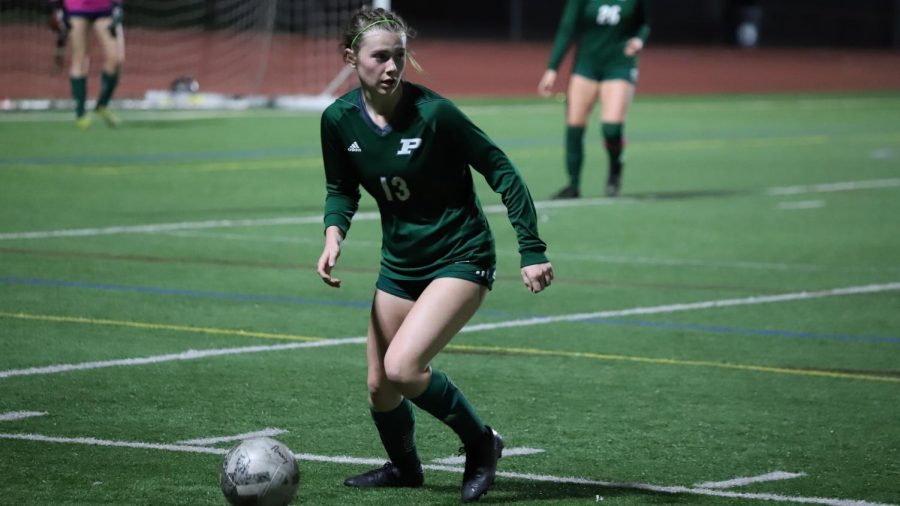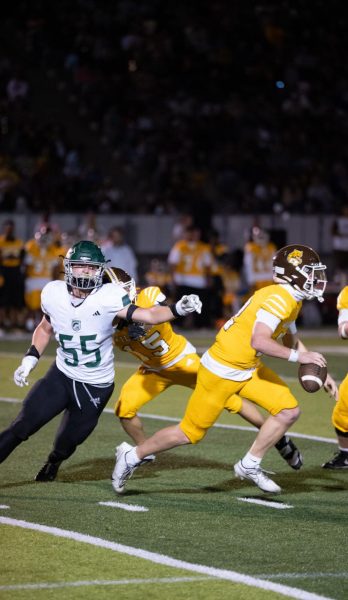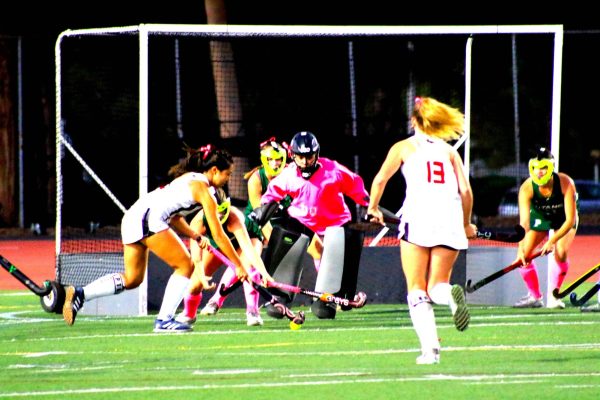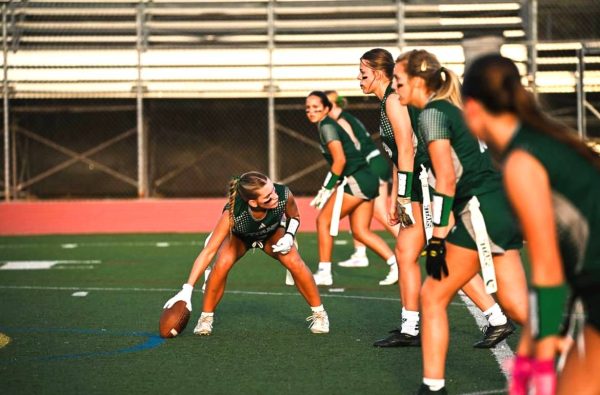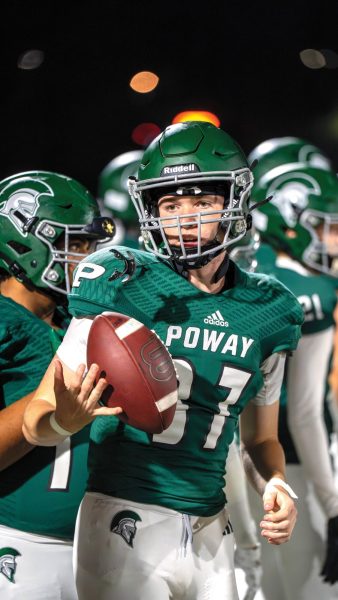Making The Leap: Tales of College Commitment
Athletes deciding to continue their academic and athletic careers at the collegiate level
For some of the best and brightest senior athletes on campus, their abilities can open up exciting future opportunities through the recruiting process. A complex and unique journey, recruiting opens as early as freshman year. Competing at the collegiate level is a dream for many, but with so many factors to consider, the weight of such a choice is a lot to take on.
Some athletes have an idea of what they are looking for from the start, but most rely heavily on family guidance, official visits, and meetings with coaches to begin to piece together what they want. Though not all sports have reached their designated signing days yet, there have been several exciting commitments on campus.
Senior Avery Hillard is one of several Ivy League commits, She plans to go to Cornell for pole vault. Hillard’s teammate Evangeline Thomson is heading to the University of Pennsylvania.
Hillard is grateful to have some relief from the pressure and expectations of senior year. She discovered the sport on a whim, deciding to try it out as a freshman after recognizing it might fit well with her extensive gymnastics background.
The possibility of taking the sport to a collegiate level first occurred to her as a sophomore, when she hit a personal record of 13 feet and realized where the sport could take her. At times she felt lost and frustrated that she had not figured out what she wanted out of college yet. The possibilities were overwhelming.
But everything changed when the Cornell coach reached out. After taking an official visit, Hillard gained some much desired clarity.
“The main thing I was looking for was a space that prioritized both academics and athletics because I wanted that balance of having a strong academic environment and the ability to compete at a high level in the pole vault,” Hillard said.
Cornell, located in the small town of Ithaca, N.Y., was a perfect fit. And while the Ivy League doesn’t use the traditional letter of intent, they use “likely letters” which maintain that the applicant is not guaranteed but very likely to get in.
As for Hillard’s collegiate aspirations, she hopes to study developmental neuropsychology and go to the NCAA championships in pole vault. Her advice to people exploring commitment: “trust the process…as someone who has experienced their fair share of injuries and mental setbacks, it’s important to remember why you are doing the sport,” Hillard said.
The program on campus with the most commits is wrestling. The total commits so far are six. Senior Luke Condon and junior Laird Root are headed to the University of Wisconsin at Madison, where they will join several of their former teammates including Brock Bobzien and Andre Gonzales. Junior Paul Kelly is staying more local, and is committed to California Baptist University.
Kelly grew up with the dream of wrestling at Cornell. Having wrestled for 11 years, he felt in reach of his dream when colleges began to reach out to him at the end his sophomore year. Among them was Cornel, andKelly was thrilled.
“I was really excited and wanted to go, but the more research I did about the college caused me to back off . . . I considered the expense and I realized I wanted to go somewhere in California,” Kelly said.
With research he found several schools that fit what he was looking for: a Californian location, a good wrestling team, and a reputable engineering program (Kelly is interested in both civil and mechanical engineering). He had narrowed it down to three: California State UniversityBakersfield, California Polytechnic University at San Luis Obispo (Cal Poly), and California Baptist University (CBU).
Kelly was glad to have the unconditional support of his parents as he deliberated over which to choose.
“They told me that whatever I wanted was OK….I was planning to commit to Cal Poly, but when CBU reached out, it changed the whole thing. It was a really hard decision because I liked both locations, but CBU had all these little factors that put it over the edge for me,” Kelly said.
He hopes to work in the automotive industry. The advice he would give to younger athletes would be “Listen to your heart and choose based on what best aligns with what you want to do in life . . .if it feels right then go for it,” Kelly said.
Not everyone grows up certain of what sport they want to pursue, and it can take several test runs for many to find a sport that clicks. Such was the case with junior Anjolie Norton, who played soccer for many years before finding field hockey. In sixth grade she gave field hockey a try after enjoying playing it at a camp she attended.
It was a transformative event. Norton had dreamed of playing soccer in college and with the change in sport, the dream carried over as she started playing club field hockey, and eventually played for the high school team. She didn’t really have an internal understanding of her own skill at the game, which she quickly developed. Norton attributes this to her outlook.
“Honestly, I don’t really have the best mentality while playing. I tend to be a negative thinker, and I think that’s why it took me so long to acknowledge that I’m not bad. The confidence my teammates have in me has really helped build up the sense,” Norton said.
When beginning to explore colleges, she sought support from both her family and older teammates. Being a junior commit was not an intimidating prospect.
“In field hockey, it’s pretty standard to verbally commit junior year, and it’s nice to have the question answered and know where I’ll be going in a year,” Norton said.
She had narrowed it down to four colleges: Stanford University, the University of Michigan, American University, and University of Massachusetts – Amherst. Norton set out to visit each school, and get a better idea of what their programs were like.
Norton examined the schools on a variety of criteria, a large part of which was based on the school’s approach to field hockey, but also on which she felt was best for her desired area of study: sports psychology. She tried to give each school she visited a fair appraisal and be honest with herself about her likes and dislikes.
Visiting Michigan was enlightening. Norton got to meet the team, go to a football game, and explore Ann Arbor over the course of the two days she spent there.
“I knew that I would be happy here and just got the feeling that it was a once-in-a-lifetime opportunity,” Norton said.
Norton’s high school experience may have turned out vastly different than how she initially imagined it, but she has come to appreciate the unexpectedness. Her recommendation to those exploring commitment would be.
“It’s really important to keep in mind that the path you envision won’t always go the way you think it will. There’s going to be detours and setbacks, but keep working towards what you want and enjoy the journey,” Norton said.
Committed Athletes as of Feb. 17:
Wrestling
- Gabe Taylor (SR), Southern Oregon University
- Paul Kelly (JR), California Baptist University
- Juan Plaza (SR), Arizona Christian University
- Laird Root (SR), University of Wisconsin, Madison
- Luke Condon (SR), University of Wisconsin, Madison
Field Hockey
- Anjolie Norton (JR), University of Michigan
- Elizabeth Edmonston (SR), University of California, Berkeley
Football
- Conner Rath (SR), Southern Utah University
- Payton Spratt (SR) Western New Mexico University
Girls’ Volleyball
- Breeze Czapinski (SR), University of California, Davis
- Kiki Remensperger (JR), University of South Carolina
Softball
- Hailey Burns (SR), Azusa Pacific University
- Hailey Milgazo (SR), Illinois Wesleyan University
Track & Field
- Avery Hillard (SR), Cornell University
- Evangeline Thompson (SR), University of Pennsylvania
Boys’ Soccer
- Noah James (SR), Western Michigan University
- Eliot Hill (SR), University of California,San Diego
Girls’ Soccer
- Violet Santiago (SR), Boxers Pacific University
Baseball
- Ryan Kroepel (SR), Arizona State University
